The Anderson Monarchs are talented students and gifted athletes who are creating a level playing field for girls everywhere. The team plays on a modest pitch and has virtually no money. But they have something special, a sisterhood that is supported by their community of parents and their coach.
Eugene Martin is seeking financial support for a feature length documentary film about this inspiring girls’ soccer team living and playing in a tough Philadelphia neighborhood. The project will only be funded if at least $25,000 is pledged by Thursday April 21. I became a backer and hope you will too. Click here for more information. Only eleven days left!
Tag: United States
Agudelo spoils the party: SA 0, USA 1
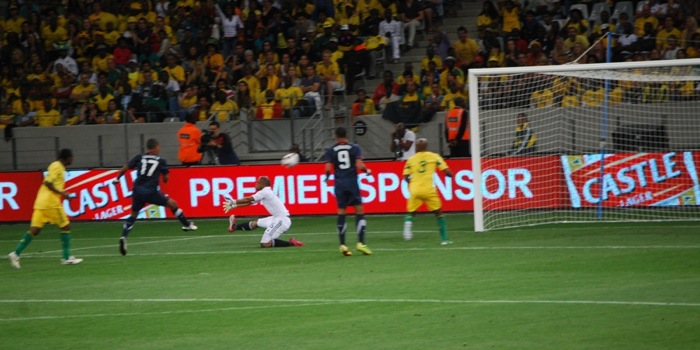
Juan Agudelo — six days shy of his 18th birthday — scored the only goal of the game in the 84th minute and spoiled a massive party in Cape Town. 51,000 of us were on hand at Green Point stadium for this glossy friendly on a warm and breezy late spring evening.
As we walked towards the ground, pubs were full of Bafana fans wearing the yellow national team shirt.
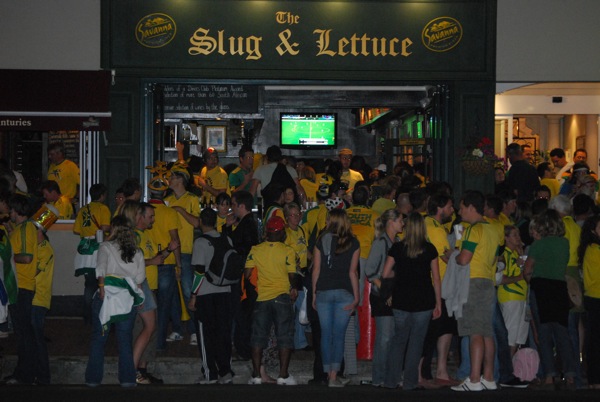
A few Americans chanted their support for the stars-and-stripes and confidently predicted a victory. The World Cup atmosphere was back (minus the FIFA branding).
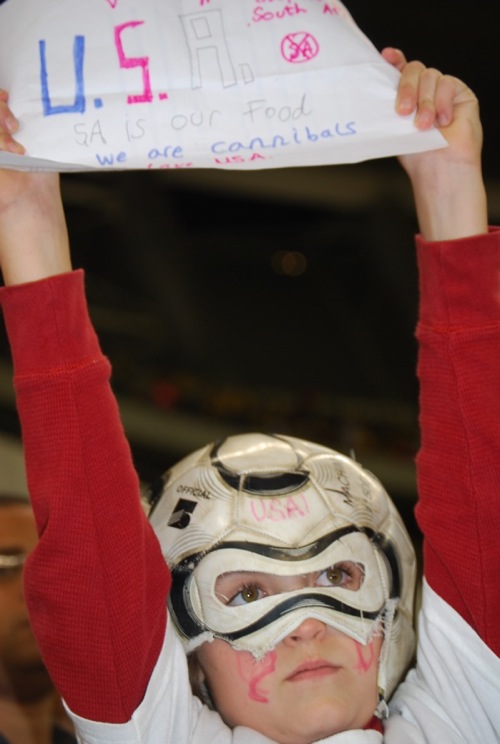
Inside the arena a welcoming vibe enveloped us. The sweet smell of football. The energy of a racially mixed and patriotic crowd. President Zuma meets the teams on the pitch. All for a good cause: the Nelson Mandela Children’s Fund. Fans belt out South Africa’s multilingual national anthem in unison: a rare, precious moment of communitas, football’s unique contribution to a fractured society searching for a shared national identity.
Unfortunately, the football on the night was crap. Let’s call a spade a spade. A strangely lethargic Bafana Bafana side knocked the ball sideways and backwards, while the second-string Americans kept their shape and every once in a while hoofed the ball forward hoping for a break. Still, the two best chances fell to the hosts who, characteristically, squandered them. 0-0 at the half. Perhaps the one silver lining for SA was Leeds striker Davide Somma’s positive debut.
Play resumed at the same monotone pace, passes going astray, nobody really able to turn defenders or take a decent shot at goal, and a series of edgy tackles that did little to improve the flow of the game. A steady stream of substitutions made matters worse. The Mexican wave takes off, a universal symbol of bored fans.
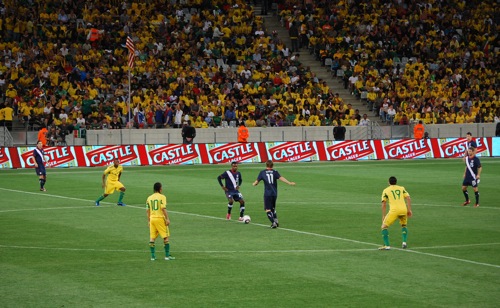
The concocted drama of penalties beckoned until the Colombian-born Agudelo, left wide open in the box, capitalized on an inviting assist by Mikkel Diskerud, a former Norwegian under-19 international whose mother is American. Bafana pressed for the equalizer, but it was too little too late.

As the home crowd filed out quietly, a group of vociferous American college students wrapped in red-white-and-blue began their celebrations. I couldn’t help but think back to the last time South Africa played in Cape Town: a 3-1 loss to Zambia in September 2007. Is the Mother City cursed?
The Americans Are Coming!
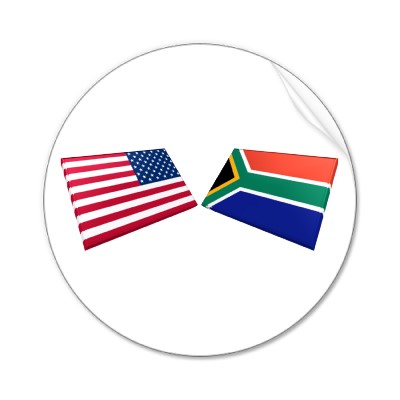 The year of Africa’s first World Cup is coming to an end. Tomorrow I am headed to Cape Town with my family for the South Africa – United States match at Green Point stadium. It’s a friendly branded as the Nelson Mandela Challenge — all proceeds go to the Mandela Children’s Fund.
The year of Africa’s first World Cup is coming to an end. Tomorrow I am headed to Cape Town with my family for the South Africa – United States match at Green Point stadium. It’s a friendly branded as the Nelson Mandela Challenge — all proceeds go to the Mandela Children’s Fund.
A couple of days ago Rodney Reiners of the Cape Argus contacted me and Anders Kelto, an American reporter and former Under-17 US national team captain, for some insights on American soccer to share with South African readers in the build-up to the match. Here’s the interview in full:
Rodney Reiners: What should South Africans know about the establishment and rise of the MLS?
PA: Major League Soccer is a legacy of the 1994 World Cup. It kicked off in 1996 and marked the resurrection of professional soccer in the USA after the demise of the North American Soccer League in 1985. (There were some other attempts at pro soccer in between the NASL and MLS but nothing terribly noteworthy.) I was at the first final at Foxboro Stadium in ’96 with 30,000 mad people in a torrential rain of biblical proportions. It ended 3-2 on a golden goal for DC United: incredible stuff. This league, it seemed to me, was going places. The NASL’s collapse a decade earlier influenced the MLS’s decision to have centralized ownership of player contracts (that is, the league owns contracts not the clubs); to not over-expand the number of teams (we now have 16); make the league more “American” and not overly dependent on over-the-hill foreign stars.
AK: And to prevent the kind of imbalances that doomed the NASL. The New York Cosmos bought the world’s most famous players and drew huge crowds, but just about every other team struggled on the field, and financially.
PA: That’s a very good point Anders. I should add that the commitment of several large corporate sponsors and multi-year TV contracts helped keep MLS afloat in the difficult early years and also legitimized it. Today, MLS competes with ice hockey as the best professional league in the country after The Big Three (NFL, MLB, NBA). That’s a significant achievement and it’s sustainable in the long term.
‘USA a team of extremes’
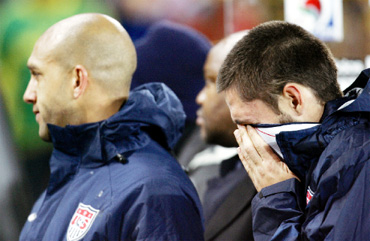
The United States’ Confederations Cup adventure generated a wide variety of reactions in America: pride in a strong effort, disappointment at letting a trophy slip away and, understandably, puzzlement. After all, not many squads can look awful against Brazil one week then nearly beat them the next. “Which team will show up during the rest of World Cup qualifying, as well as in South Africa next summer?” wrote ESPN’s Jeff Carlisle. “Will it be the side that struggled early during the tournament or the one that finished with a flourish, even in losing a heartbreaking final to Brazil?”
A likely answer is: both. Instead of fretting over the US’s baffling form, however, we should revel in it. The traditional soccer narrative of the United States, dating to the 1970s, highlights the country’s supposedly enormous potential. But rather than waiting another few decades for the US to become a power, why not embrace its unpredictable, quirky side?
True, the current edition of this team is infuriatingly inconsistent. But at least it’s a marvel of inconsistency. Whereas Mexico always lose in the second round of the World Cup – yawn – the United States’ sheer unpredictability makes the team worth following. In June alone, Team USA was routed by Costa Rica in World Cup qualifying, then confidently snapped Spain’s three-year unbeaten run.
While all teams have peaks and valleys over time, the US frequently packs them into 90 minutes. Consider the World Cup campaign. In El Salvador in March, the US played a horrible 75 minutes to fall behind 2-0, before a frantic rally produced two late goals and further untaken chances. At home to Honduras in June, the US fell behind within five minutes before scratching out a victory – an uneven performance personified by Carlos Bocanegra, who headed in the winner, then immediately got taken off with an injury after the restart. With these guys, good and bad are intertwined.
Impressively, the United States can produce these trademark half-good, half-dismal efforts against anyone. And they don’t always involve late rallies. Against Brazil and Italy in the Confederations Cup, fast starts and half-time leads were followed by three-goal second-half meltdowns. The excitement of sport comes from its uncertainty, does it not?
As a bonus, Team USA routinely makes blowhard pundits look silly. “We have raised a generation of boys as opposed to men in US soccer,” said Alexi Lalas after the slow start in the Confederations Cup. The national team then promptly rolled into the final. And while Lalas and fellow TV commentator John Harkes spew out ever-shifting prescriptions for coach Bob Bradley – better attitude, more domestic players, more steel in midfield – the reality is that no one knows how the team will perform at any time. As Tim Howard said after the 3-0 win over Egypt: “We are scratching our heads just like you guys.” Who needs experts? This team calls into question the whole premise of expertise.
Ultimately, it’s futile to extract lessons about the national team’s long-term future from every match. The future is already here, and the US has firmly established itself. Not as a world power, but as one of those rare national teams – think Portugal or Nigeria – whose mystifying form is itself an attraction. Granted, this is not what many American fans desire most, given their expectations of sporting dominance. But for some of us, it’s a welcome state of affairs.
Peter Dizikes in (the British) When Saturday Comes.
David Beckham’s American misadventure
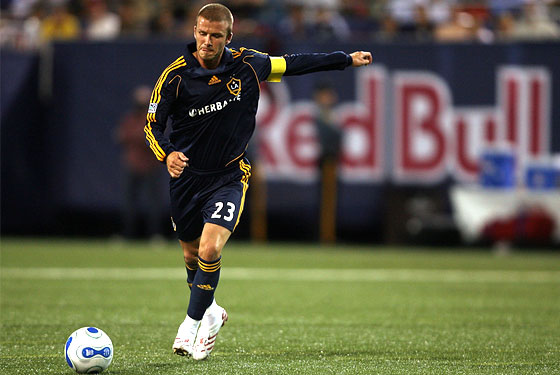
In two weeks time the ageing David Beckham has to return to the United States and play for the Los Angeles Galaxy in the MLS (against the New York Red Bulls at Giant Stadium outside New York City). In January this year, Beckham left the MLS mid-season to go play for AC Milan in Italy’s Serie A. Blasphemous to the MLS. Not surprisingly, Beckham has not been very enthusiastic about returning to the US. In 2007 Beckham had arrived, with much fanfare, at the Galaxy. His salary about 10 times that of the average MLS player. Sports Illustrated’s football writer, Grant Wahl, has been following Beckham for the last two years and his book on Beckham’s time at the Galaxy is coming out this month in the US (on July 14). As part of the hype, SL today published a lengthy excerpt from the book on its website. (It’s also in the latest issue of the magazine.) Among other things, Wahl writes about the cold war between Beckham and the Galaxy’s Landon Donovan (over who was the bigger star, as there is any comparison here), describes Beckham’s time at the Galaxy as “an epic disaster” and a “soccer fiasco,” that Beckham was a “cheapskate” (he did not pick up the tab after a night out with his much poorer teammates), reveals the process behind who appointed disastrous coach Ruud Gullit, and Beckham’s deficient captaincy skills. This should be fun.
Read here.
Did Stephen Colbert play himself?
| The Colbert Report | Mon – Thurs 11:30pm / 10:30c | |||
| Is it Time to Care About Soccer? | ||||
|
||||
Like a number of other US commentators, comedian Stephen Colbert, who plays a faux-Bill O’Reilly on his show, had to discuss the future of football in the United States. As he describes soccer in the video, above: “.. The sport that [Americans] are the world champions at ignoring.” The US’s success in the Confederations Cup (against all expectations they made it to the final where they lost, after leading 2-0, to Brazil on Sunday), leads Colbert to mock-ask: “Is it time to care about soccer?” What follows is a send-up of American caricatures of football: rioting, David Beckham and warm beer. It’s satire after all. But then Colbert asks his producer to show some “thrilling soccer highlights” and we see video of players of a team in blue passing the ball around sort of aimlessly. The camera then cuts back to Colbert snoozing.
The thing is, unless Colbert or his producers (and his audience?) were in on the joke, they made fools of themselves with that clip as they missed one of the greatest goals of all time: a 25-pass move that resulted in a goal for Argentina against Serbia in the 2006 World Cup in Germany:
After shocking Brazil with their aggressive, physical style in the first half of the Confederations Cup final, the United States first gave up a two-goal halftime lead and then eventually lost 3-2 to Brazil. Brazilian defender Lucio scored the winning goal with 6 minutes of regular time remaining.
The way the US lost, left The New York Times’ correspondent (who up until the day of the final was announcing a new dawn for US soccer after the shock wins over Egypt and Spain), in a state of depression: “The United States is still a developing nation in men’s soccer,” he opined.